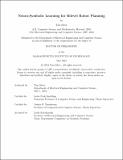| dc.contributor.advisor | Kaelbling, Leslie Pack | |
| dc.contributor.advisor | Tenenbaum, Joshua B. | |
| dc.contributor.author | Silver, Tom | |
| dc.date.accessioned | 2024-09-03T21:14:24Z | |
| dc.date.available | 2024-09-03T21:14:24Z | |
| dc.date.issued | 2024-05 | |
| dc.date.submitted | 2024-07-10T13:02:10.644Z | |
| dc.identifier.uri | https://hdl.handle.net/1721.1/156646 | |
| dc.description.abstract | Decision-making in robotics domains is complicated by continuous state and action spaces, long horizons, and sparse feedback. One way to address these challenges is to perform bilevel planning, where decision-making is decomposed into reasoning about “what to do” (task planning) and “how to do it” (continuous optimization). Bilevel planning is powerful, but it requires multiple types of domain-specific abstractions that are often difficult to design by hand. This thesis proposes the first unified system for learning all the abstractions needed for bilevel planning. Beyond learning to make planning possible, this thesis also considers learning to make planning fast, especially in environments with many objects. A final contribution considers planning to learn, where the robot iteratively plans online to collect additional data and then learns to improve planning. Altogether, the thesis represents a step toward a general-purpose robot that can autonomously synthesize a specialized library of abstractions and plan to solve a very broad set of tasks. | |
| dc.publisher | Massachusetts Institute of Technology | |
| dc.rights | In Copyright - Educational Use Permitted | |
| dc.rights | Copyright retained by author(s) | |
| dc.rights.uri | https://rightsstatements.org/page/InC-EDU/1.0/ | |
| dc.title | Neuro-Symbolic Learning for Bilevel Robot Planning | |
| dc.type | Thesis | |
| dc.description.degree | Ph.D. | |
| dc.contributor.department | Massachusetts Institute of Technology. Department of Electrical Engineering and Computer Science | |
| mit.thesis.degree | Doctoral | |
| thesis.degree.name | Doctor of Philosophy | |
